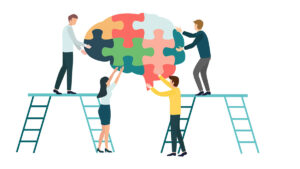How the Artificial Intelligence arms race is set to change the way we assess other humans

The use of AI in choosing the best applicant for a role is already the new reality. Pic via Getty Images.
The rise of AI will have a profound impact on the way businesses will compete for top talent. It’s an arms race investors should be watching closely, according to Compono CEO Rudy Crous.
Artificial Intelligence (AI) has been making its way into the recruitment process for some time. One of the biggest challenges any business faces is sorting out the wheat from the chaff of potential candidates.
An AI tool that can quickly scan a resume and whittle that list down for you is, on the surface, a powerful tool.
The opposite however is also true: AI-powered résumé builders can help job seekers create resumes that are more likely to catch the attention of recruiters and hiring managers.
AI can quickly scan through your LinkedIn or existing résumé to help write it in a way that improves your odds of landing a job, while also making it much easier to apply for many jobs.
This results in an arms race to the bottom: AI generated content being assessed by AIs. Taking the time to write a well-crafted application is pointless if it is drowned out in a sea of generated applications, and reading through those applications and considering them individually becomes impossible.
The ball is already rolling
This is not a prediction – the process has already begun. A quick search online will provide helpful hints to help increase your chances of advancing to an interview, through writing applications that an AI will interpret favourably.
It’s a problem borne out of a fundamental flaw in the way we apply for jobs in the first place. Submitting a list of skills and experiences on a page (the typical résumé and cover letter), which contains virtually no data on who you are as a person, has become the status quo.
Research shows that résumés are generally a bad indicator of how someone will perform on the job, because it makes the assumption that those skills and experiences are going to determine your success in the role.
The way we apply for roles and assess candidates needs an overhaul. We need to refocus our attention onto what actually matters: job fit, work personality and culture match.
To do this properly requires an understanding of how your business works, what you are looking for in an employee, and seeing how well candidates are aligned.
You then also need to factor in that often organisations will have the wrong idea of who and what they want – and the candidates similarly have the same errors of judgement.
The only way to improve the situation is to look for more objective assessment methodologies.
The inclusion of psychometric assessments in recruitment has started to explore this; however, too often psychometric assessments are done at the last stage in the hiring process.
Switching things up for a better result
I would argue this should be switched around so that psychometrics plays a more prominent role from the outset – particularly now that technological advances have made data analysis far more accessible and affordable for businesses.
After all, you can train someone to have the right technical skills, but you cannot easily change a person to have the right attitude and job motivation.
AI will disrupt many aspects of work, but the way it will impact recruitment is being greatly underestimated. However, the importance of human capital is not something that will diminish in our lifetime, because AI is still just a tool that enhances productivity.
Businesses that can avoid the résumé arms race and claim a consistent, competitive advantage in this space, will find themselves greatly rewarded by investors in the years to come.
This article was developed in collaboration with Compono, a Stockhead advertiser at the time of publishing.
This article does not constitute financial product advice. You should consider obtaining independent advice before making any financial decisions.
Related Topics
UNLOCK INSIGHTS
Discover the untold stories of emerging ASX stocks.
Daily news and expert analysis, it's free to subscribe.
By proceeding, you confirm you understand that we handle personal information in accordance with our Privacy Policy.








